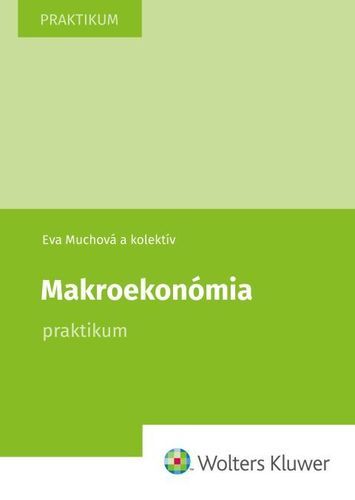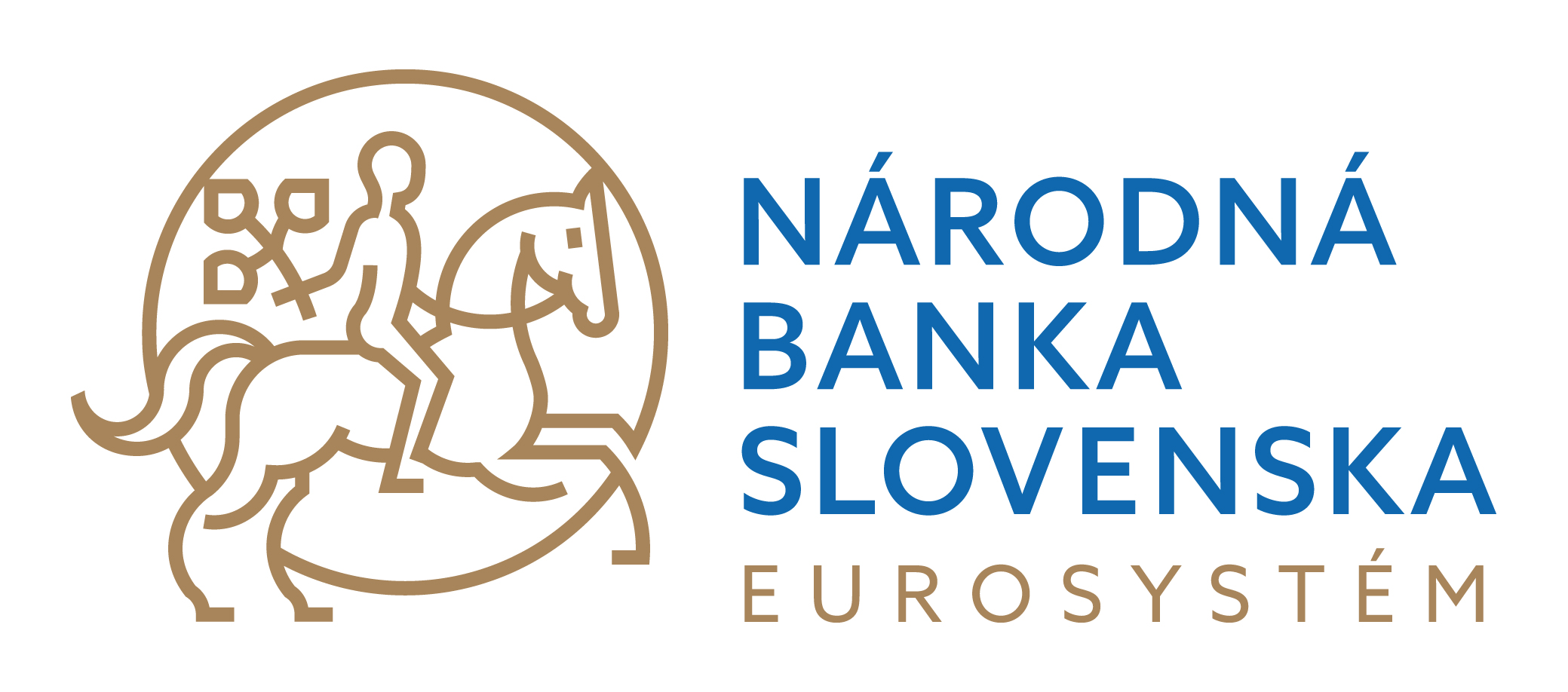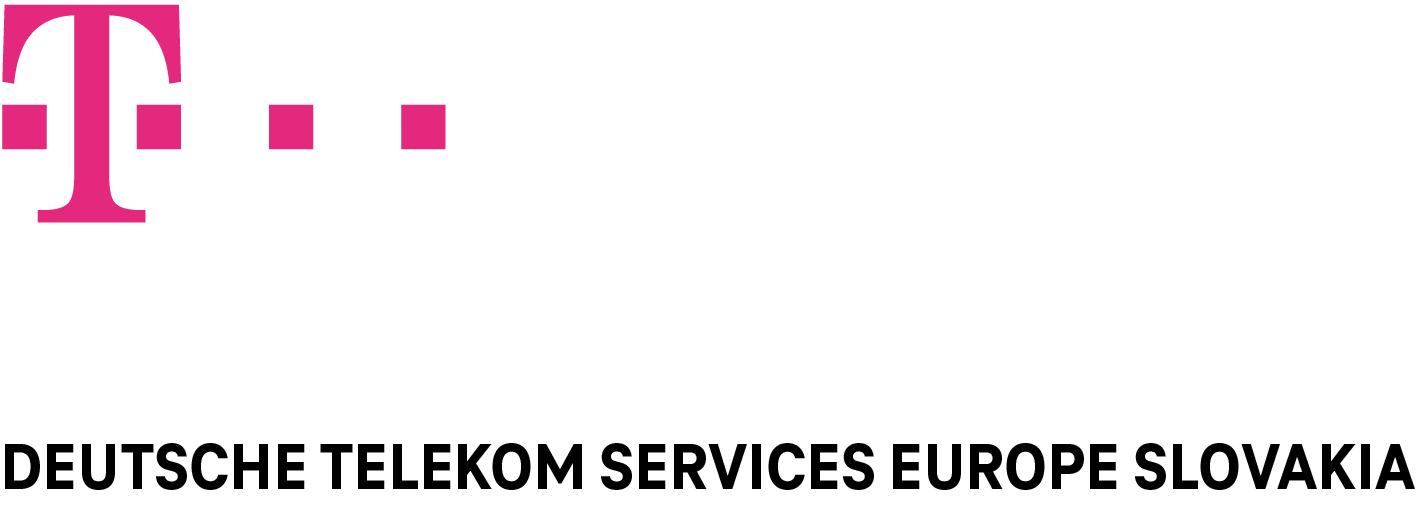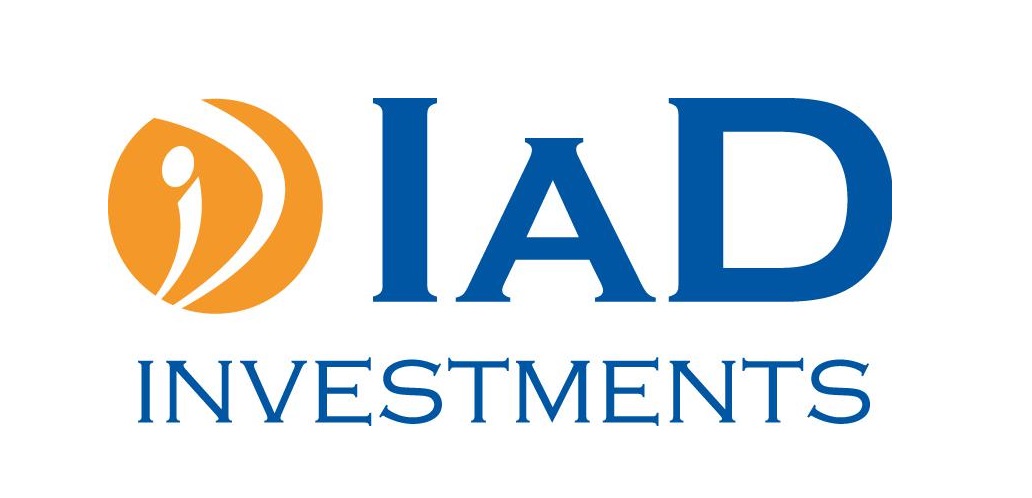Department of Microeconomics
Courses:
- Principles of Economics 1
- Microeconomics (I. level)
- Microeconomics (II. level)
- Advanced Microeconomics
- Seminar in Applied Microeconomic Analysis
- Microeconomics
- Advanced Microeconomics
- Advanced Topics in Microeconomics
The strategic direction of the Department of Microeconomics is oriented towards:
Pedagogical area:
- Creating an innovative framework of subjects in the new study program Applied Economics in Slovak and English in order to prepare students for their future career.
- Development of critical thinking, creativity, complex reasoning, teamwork and new skills required by employers in the context of the growing influence of artificial intelligence on the labor market.
Research area:
- Active involvement of all members of the department in domestic projects.
- Strengthening the participation of department members in international research projects.
Publication area:
- Increase the number of department members who regularly publish in journals that are included in the ABDC database and the EUBA Star list.
In scientific research activities, members of the Department of Microeconomics focus primarily on the following research areas:
- Consumer behavior and household decision-making
- Game theory and firm strategy in conditions of different types of competition
- Labor market and migration in the context of microeconomic analyses
- Application of behavioral economics in decision-making processes
- Digital transformation and its microeconomic consequences
Department of Macroeconomics
Courses:
- Principles of Economics 2
- Macroeconomics (I. degree)
- Macroeconomics (II. degree)
- Advanced Macroeconomics
- Seminar of Applied Macroeconomic Analysis
- Methodology of Economics
- International Economics and Law
- Principles of Economics (taught in English)
- Macroeconomics (taught in English)
- Advanced Macroeconomics (taught in English)
- Advanced Topics in Macroeconomics (taught in English)
Strategic orientation:
- Improving the quality of lectures and seminars provided by members of the Department.
- Involve all Department members and increase their participation in international research projects.
- Increasing the proportion of outputs published in journals included in renowned databases.
In scientific and research activities, members of the Department focus primarily on the following research topics:
- International labour migration and its impact on the labour market in Slovakia and EU countries.
- Indebtedness of economic subjects and EU countries in the context of fiscal sustainability.
Department of Methodology and Development of Economics
Courses:
- Methodology of Economics
- General Economic History
- Development of Economic Science
- Theory of Public Choice
- Behavioural Economics
Strategic orientation:
Pedagogical area:
- Use of innovative teaching methods.
- Implementation of digital technologies in the teaching process (gamification of teaching, use of video presentations, online quizzes).
Publication area:
- Focusing on the publication of scientific works in scientific journals in CC, WoS, Scopus databases.
- Preparation of textbooks for subjects provided by the Department of Methodology and Development of Economics.
Scientific area and project activities:
- Active search for international contacts in order to participate in international projects.
- Respond to calls regarding the submission of projects in Slovakia and abroad (domestic schemes – VEGA, KEGA, APVV, foreign schemes – for example COST, Horizon, options within the Erasmus+ program).
In scientific and research activities, members of the Department focus primarily on the following research topics:
- Behavioural economics
- Economics of the public sector
- Methodology of Economics
- Economic history
- Heterodox and orthodox approaches in economic theory
- Public choice theory
- Hits: 4901
Microeconomics - Practicum (2024)
A team of authors from the Department of Microeconomics has prepared a publication called Microeconomics - Practicum. The presented book is intended for students of the University of Economics in Bratislava, to whom it provides the opportunity to practice their knowledge of the basics of microeconomics. The publication deals with 13 basic topics that are taught in basic courses of microeconomics at faculties of economics, focusing primarily on the use of graphs and examples in economics.
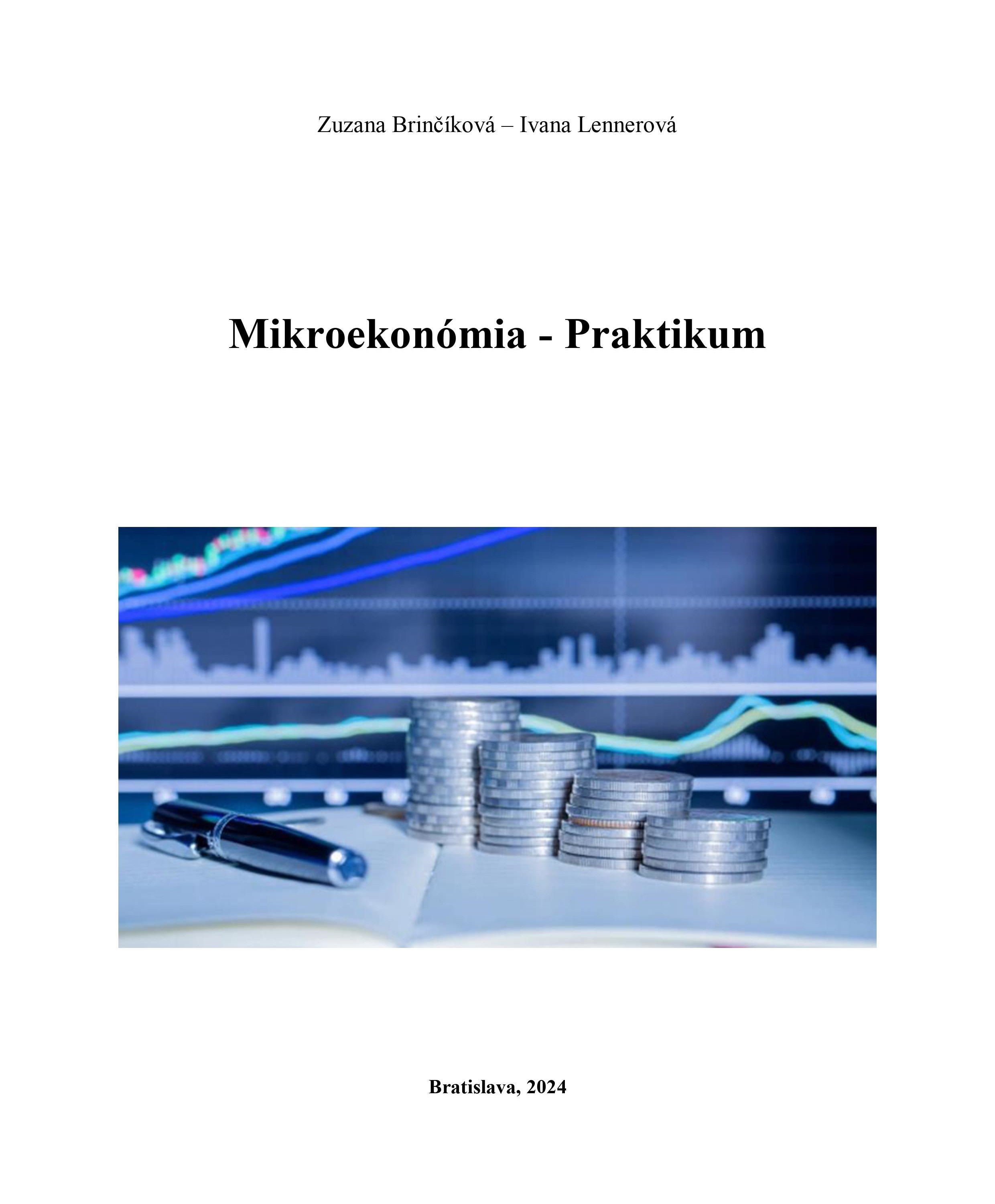
Macroeconomics (2024)
The textbook provides a comprehensive view of macroeconomics, which examines phenomena such as sustainable economic growth, inflation inertia, public debt, real interest rate, convergence or secular stagnation. All the main macroeconomic categories, concepts, models and macroeconomic policies are clearly explained in the publication. The reader will also learn more about the issue of macroeconomic equilibrium, inflation expectations, standard and unconventional monetary policy, the trilemma of macroeconomic policies, as well as behavioral macroeconomics as a new approach to macroeconomic analysis. The authors of the textbook encourage the reader to form opinions and the ability to apply the acquired knowledge. The textbook is intended primarily for students of the macroeconomics course at universities, but also for the general public.
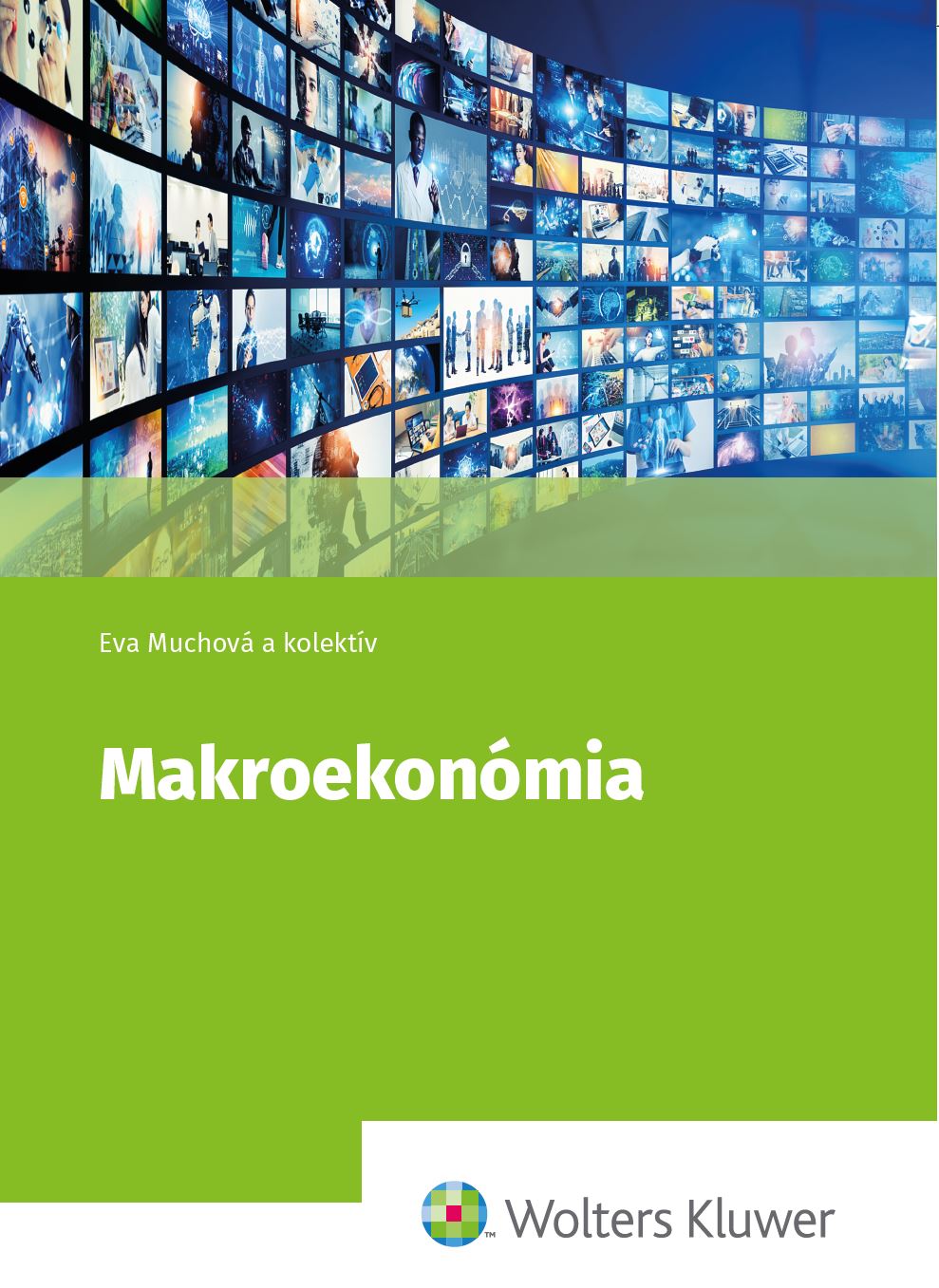
Economics (2022)
The publication provides an insight into the functioning of the market mechanism, as well as an overview of key microeconomic and macroeconomic approaches that will help the reader understand the functioning of market economies at the level of firms and households, as well as at the level of the economy as a whole. The publication also includes an explanation of the basic categories and knowledge of the macroeconomics of the open economy and integration processes from a theoretical point of view and in Europe. The text is based on the current state of knowledge and reflects current trends in the development of economic science and economic practice.
The publication is intended primarily as a textbook for basic economics courses at universities, but it will serve all those who want to gain systematic knowledge of this scientific discipline.
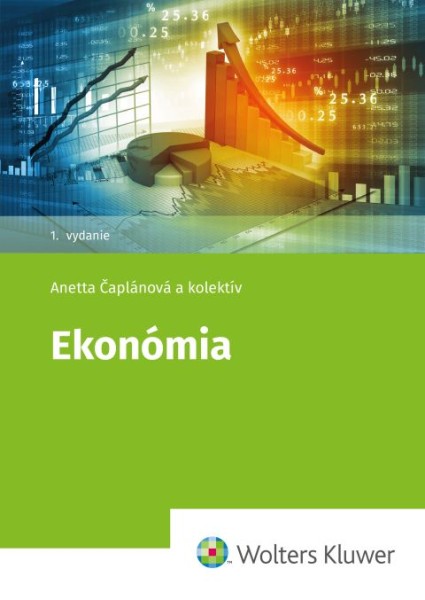
Economics - Practicum (2022)
The aim of the authors of the publication is to encourage students of economics courses to systematically prepare for seminars, independently develop economic tasks and think about various options for solving economic problems. To achieve these goals, the practicum contains numerical and graphic tasks, but especially tasks focused on a creative approach, i.e. logical tasks and tasks for thinking about economic phenomena with the necessary argumentation and justification of the expressed opinions. We believe that such an approach increases interest in economic science and thus contributes to the development of economic thinking.
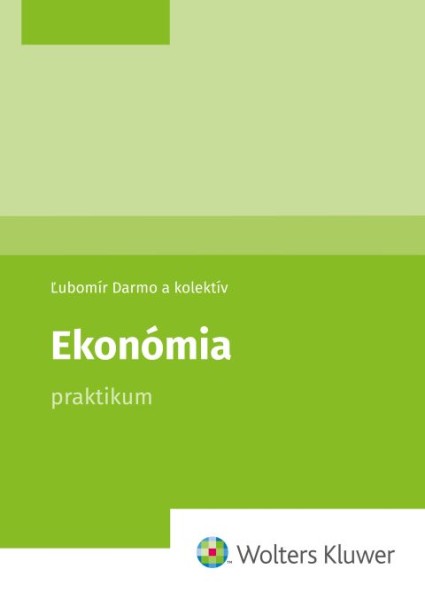
Pollution and environmental quality violations: Finding the right emission permit prices for NO2 EDPs (2022)
Prof. Ing. Anetta Čaplánová, PhD. co-authored an article entitled "Pollution and environmental quality violations: Finding the right emission permit prices for NO2 EDPs".
The article theoretically and empirically addresses the design of efficient trading of NO2 pollution permits. It is published in the journal Socio-Economic Planning Sciences, which is in Q1 according to Scimago and has an H-index of 52.
The article is available here: https://www.sciencedirect.com/science/article/pii/S0038012122000507?dgcid=coauthor
Business Cycle: Economic, Sociological and Behavioural Aspects (2021)
At the end of 2021, a team of authors from the department published a monograph published by a foreign publisher dedicated to the issues of the business cycle. The authors participated in its processing: Anetta Čaplánová, Eleonóra Matoušková, Zsolt Horbulák and Eva Sirakovová. Research on the issue of the business cycle in this publication does not remain only on a purely economic level. The authors expand the view of cyclical fluctuations in economic activity to include sociological, historical and psychological aspects. Special attention is paid to the starting points of behavioral economics for examining the cyclical development of economies. A special subject of interest of the authors are also the non-economic causes of economic crises, specifically pandemics and wars. The monograph is the output of the VEGA 1/0239/19 project "Implications of behavioral economics for streamlining the functioning of contemporary economies".
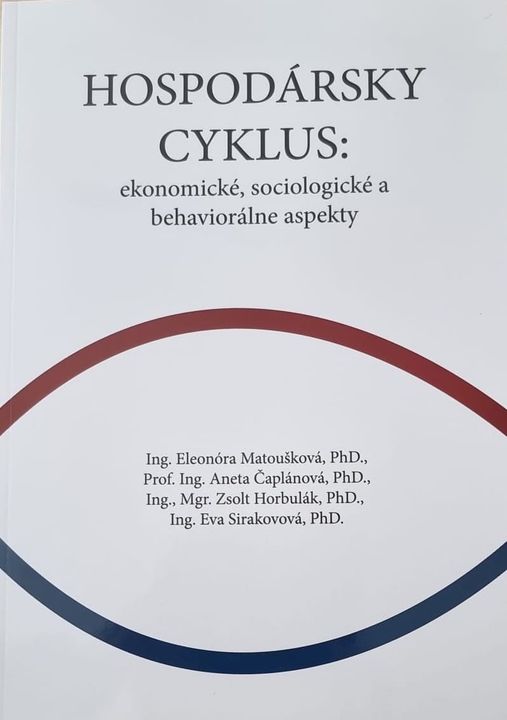
Project Publication Collaboration for Effective Digital Education (D-COLLAB) (2021)
As part of the implementation of the D-COLLAB project at the Department of Economics, the first publication entitled "Digital Education in the Era of Covid-19: Findings on the needs of university instructors and students" was issued.
The publication is focused on the methodological and technological aspects of digital education during the COVID-19 pandemic and is based on the analysis of the results of a survey among students and academics of the University of Economics in Bratislava regarding online teaching. Special attention is paid to students with special needs and the challenges they face during their online studies.
The publication is published in English and is freely available at the following link: http://d-collab.cs.ucy.ac.cy/wp-content/uploads/2021/11/D-CollabIO1final.pdf
You can learn more about the D-COLLAB project on the project page http://www.dcollab.eu/
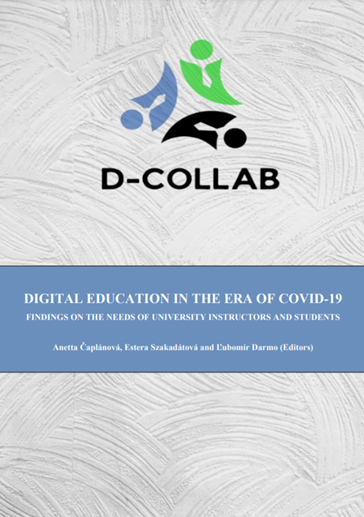
Macroeconomics - practicum (2021)
We present you an effective tool for practicing and understanding the subject of macroeconomics by the authors: Peter Leško, Marta Martincová, Eva Muchová and Karol Trnovský. A teaching aid consisting of 19 chapters, each containing theoretical background on the topic, basic concepts, examples and graphical analyses, reasoning tasks, assessing the veracity of statements, test questions and text supplementation. Students can compare their solutions to the tasks with the correct solutions and procedures that are listed at the end of each chapter. In terms of content, the textbook is compatible with the mainstream of macroeconomics, which is represented by relevant textbooks of macroeconomics, for example by N. G. Mankiw, O. Blanchard, P. Krugman or R. Holman. The teaching text is a practical tool for students when preparing for seminars and exams at home, but also for teachers when working on seminars.
An analysis of impact of personality traits and mindfulness on risk aversion of individual investors (2021)
If you are a woman, you should be more risk-averse, and if you meditate regularly, you should also be more risk-averse.
Did you know that emotionally stable people are significantly less risk-averse and open-minded people are more risk-averse? That older people and women are more risk-averse? These and other findings are brought by a new article authored by KET member Prof. Ing. Anetta Čaplánová, PhD., who, together with her colleague Vesarach Aumeboonsuke from the partner university NIDA Bangkok, Thailand, conducted original research aimed at analysing individuals' attitudes towards risk and financial decisions. Their original analysis of the impact of "mindfulness" on individuals' attitudes to risk deserves attention. The data obtained in this way allowed the authors to reach the above conclusions.
You can read more HERE:
https://link.springer.com/article/10.1007%2Fs12144-021-02015-9?fbclid=IwAR0Gb465h9SqpmHKTJhJI0XOOpwwyJ8wbA1PWCgLBNyp7kUNPCgv72sAWEA
The journal Current Psychology, in which the article was published, has an H-index of 41, is in Q2 according to Scimago and has an Impact factor of around 2.00. Congratulations!
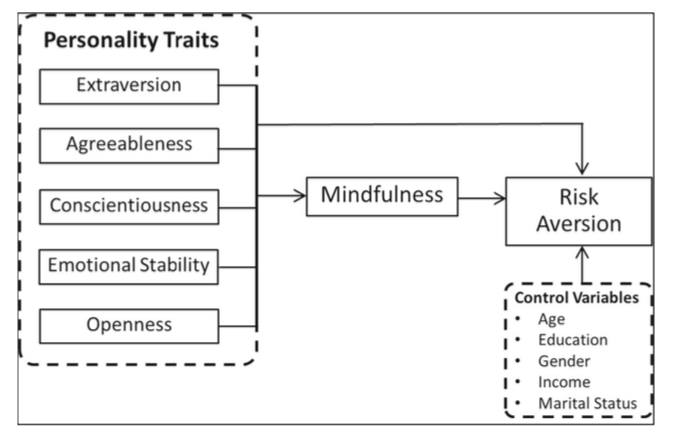
A dynamic model for a common market for emission allowances as a way to address persistent pollutant pollution (2021)
We would like to draw your attention to a new article published in co-authorship by our colleague - Prof. Ing. Anetta Čaplánová, PhD. In the article entitled "Dynamic Model of the Common Market with Emission Permits as a Way to Solve the Problem of Pollution by Persistent Substances" , the authors elaborate on a dynamic model of the common market for trading in emission permits for pollutants, which they propose as an alternative solution to the problem of persistent air pollutants. The authors of the article derive rules for pricing based on marginal costs and examine pricing in conditions of differently formulated restrictions. They also examine the functioning of the proposed market design on the basis of the simulations carried out. In particular, this contribution can help to address potential problems in the trading of emission allowances, e.g. breaches of regional environmental standards in different locations. The proposed approach also has the potential to significantly reduce transaction costs that normally occur in emissions trading.
The article is available here: https://polek.vse.cz/artkey/pol-202103-0001_dynamicky-model-spolocneho-trhu-s-emisnymi-povoleniami-ako-sp-sob-riesenia-problemu-znecistovania-perzistentnym.php?fbclid=IwAR0Gb465h9SqpmHKTJhJI0XOOpwwyJ8wbA1PWCgLBNyp7kUNPCgv72sAWEA
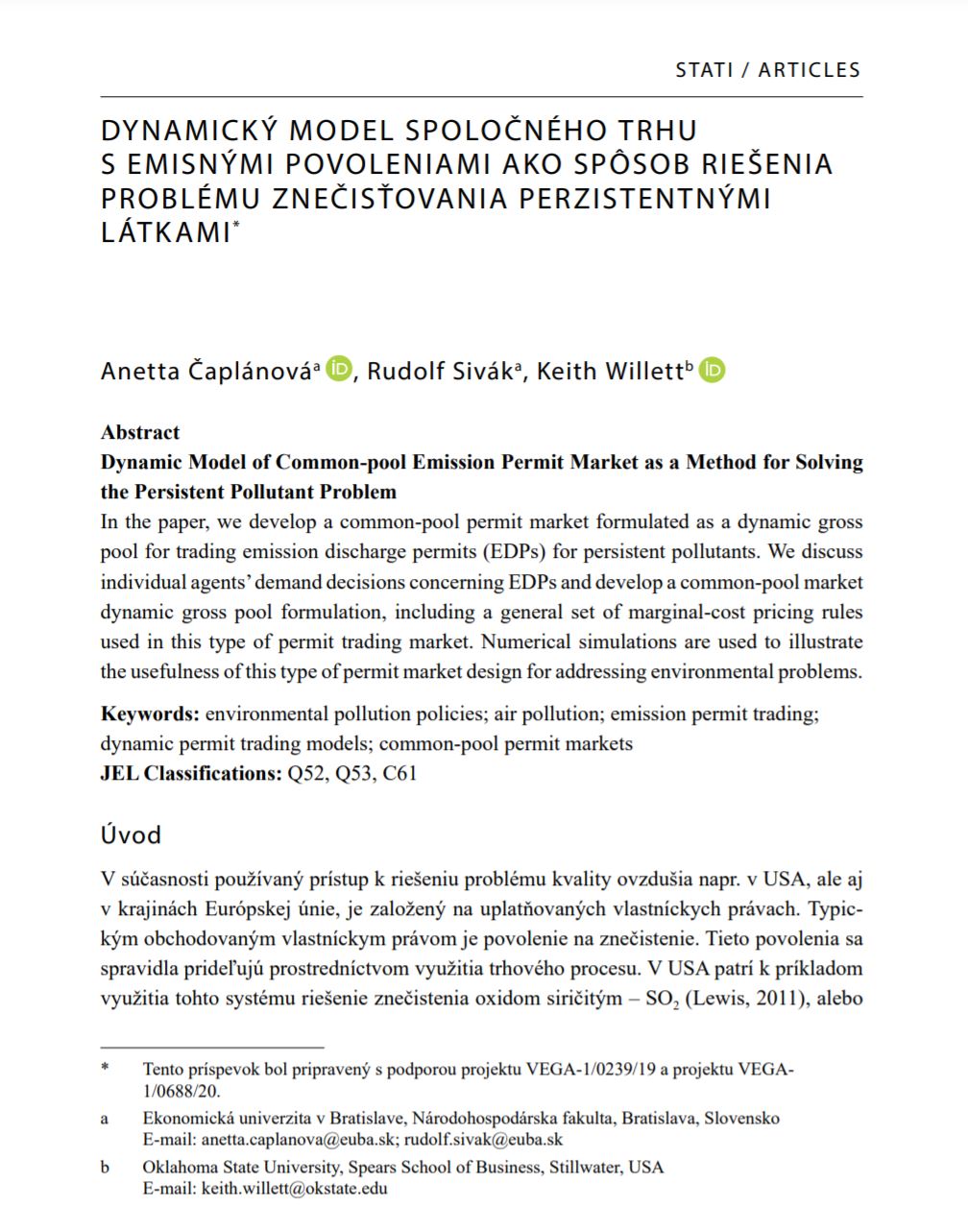
Institutional Trust and Compliance with Measures to Fight COVID-19 (2021)
We would like to draw your attention to a new publication co-authored by our colleague Prof. Čaplánová examining the impact of institutional factors on compliance with anti-epidemiological measures in connection with the COVID-19 pandemic, based on an analysis of data collected in Slovakia. The results confirm the importance of trust in key institutions for compliance with anti-pandemic measures.
The publication is available at the following link: http://link.springer.com/article/10.1007/s11294-021-09818-3
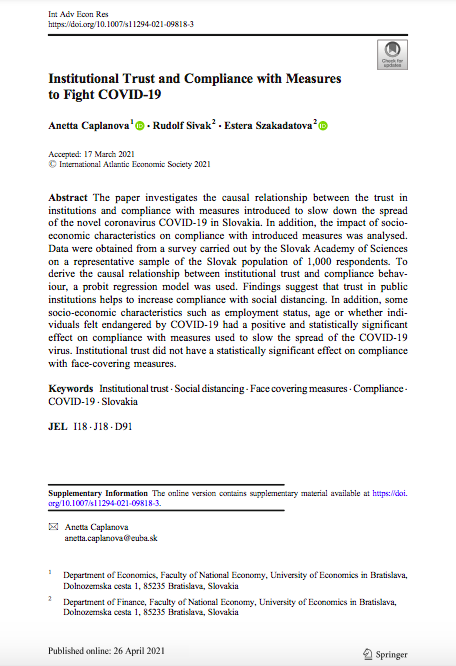
Principles of Economics (2021)
We would like to draw your attention to a new publication entitled Fundamentals of Economics, which was co-authored by our colleagues Prof. Ing. Eva Muchová, PhD, Ing. Ľubomír Darm, PhD. and Ing. Peter Leško, PhD.
The textbook is primarily intended for those interested in studying economics at universities, but it can also be useful as a repetition for economics students at faculties of economics. At the same time, the textbook is aimed at the general public who want to gain knowledge about basic concepts, relationships and contexts in economics. In the textbook, the reader will learn the answers to several questions, e.g. how to understand various turbulences in economic life; how consumers decide how much of their income to consume and how much to save; how a business sets prices and quantities of its products; how the government affects the economic development of the country; why cyclical developments occur in the economy; how the central bank can affect the inflation rate.
The publication is available at the following link: https://obchod.wolterskluwer.sk/sk/zaklady-ekonomie.p4955.html
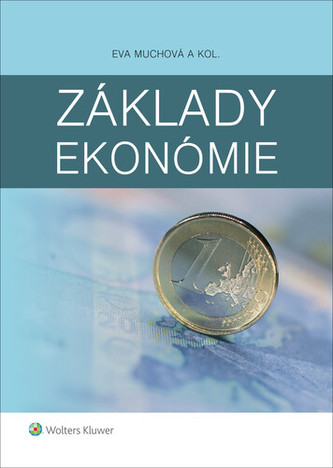
Financial Literacy Survey in the Slovak Republic (2021)
The team of authors of the Department of Economics consisting of Ing. Marcel Novák, PhD., Ing. Karol Trnovský, PhD. and Ing. Ľubomír Darmo, PhD. published a new article that examines the level of financial literacy in the Slovak Republic. The main objective of this article is to evaluate and compare the achieved level of financial literacy on a sample of the Slovak population (students of the Slovak University of Technology in Bratislava). The chi-square test was used to determine the relationship between different variables (gender, level of education and comparison of results with those from previous surveys), the correctness of respondents' answers to the questionnaire and to identify the level of financial literacy of university students without a specific economic background. The results of the research suggest that gender and educational level (bachelor's or master's degree) have no effect on the level of financial literacy of students. On the contrary, respondents in our survey achieved better financial literacy than respondents in the survey of the Slovak Banking Association.
The article is available at: https://cgscholar.com/bookstore/works/financial-literacy-survey-in-the-slovak-republic
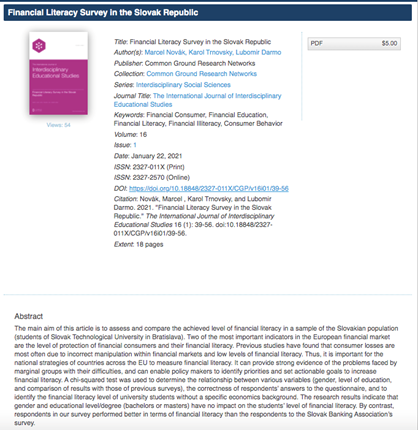
Agricultural commodity price dynamics and theirdeterminants: A comprehensive econometric approach (2020)
We would like to draw your attention to a new scientific article by RNDr. Jaroslava Hloušková, PhD. The article presents a complex system of models aimed at quantifying the reaction of agricultural commodity prices (specifically wheat, soybeans and corn) to changes in their potential determinants. Possible nonlinearities in commodity price dynamics over the business cycle are also taken into account. The results suggest that variables that represent market fundamentals and macroeconomic developments contain systematic predictive information for commodity price forecasts, and that agricultural commodity prices respond robustly to shocks in international competitiveness.
The full text of the article is available at: https://onlinelibrary.wiley.com/doi/epdf/10.1002/for.2768
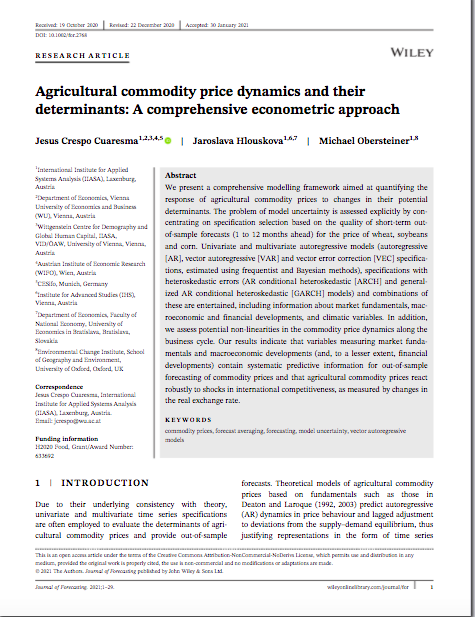
The relationship between foreign direct investment inflows and unemployment in the Slovak Republic (2020)
A team of authors from the Department of Economics – Ing. Ľubomír Darmo, PhD., Ing. Marcel Novák, PhD. and prof. Ing. Ján Lisý, PhD. published an article entitled "The Relationship Between Foreign Direct Investment Inflow and Unemployment in the Slovak Republic", in which they seek an answer to the question whether unemployment in the host country affects the inflow of foreign direct investment, or vice versa, the inflow of foreign direct investment has an impact on unemployment. The results suggest that the impulse is based on the unemployment rate, which in turn affects the inflow of investments into the Slovak Republic, but the duration of this effect is very short.
The full text of the article is available at: https://polek.vse.cz/pdfs/pol/2020/04/04.pdf
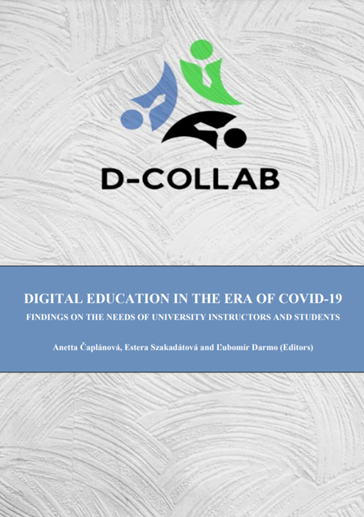
Determinants of the FDI Inflow into the Visegrad Countries (2020)
We would like to draw your attention to an article that was co-authored by our colleagues Ing. Ľubomír Darm, PhD. and Ing. Marcel Novák, PhD. investigating the determinants of FDI inflow to the Visegrad Group countries. FDI inflows are determined by many factors, which are sufficiently researched in publications and articles. However, the determinants of FDI inflows to the Visegrad Group (V4) countries have several specifics stemming from their transformation process. The article identifies specific determinants of the inflow of foreign direct investments into the V4 countries. The authors found that the size of the economy or its potential, labour productivity, corporate income tax, wages, unit labour costs, inflation, education of the workforce, openness of the economy, quality and development of infrastructure (represented by the density of the road and rail network), level of corruption and membership in the Economic and Monetary Union are factors that affect the level of inflow of foreign direct investment into the V4 countries.
The full article is available at: https://www.sav.sk/journals/uploads/1215135110%2020%20Darmo%20a%20kol%20-%20aut+SR.pdf
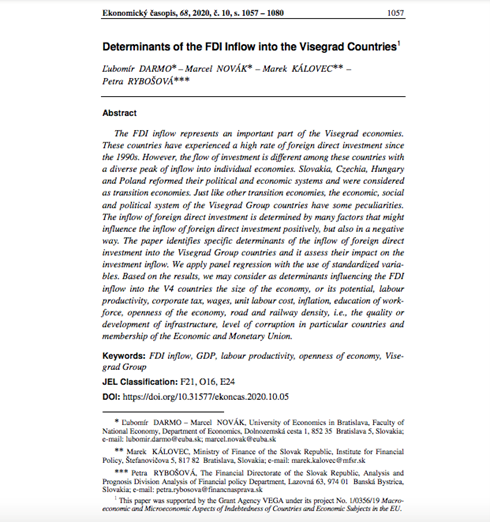
Trade Elasticities in the Slovak Republic (2020)
Article by Ing. Zuzana Brinčíková, PhD. and Ľubomír Darma, PhD. It examines the effects of income and relative prices on international trade. The basis of the research is an estimate of price and income elasticities of international trade in the case of the Slovak Republic for the period 1995 – 2018. Slovakia, as a small and very open economy with a relatively limited domestic market, insufficient raw materials and low agricultural potential, is destined for the further development of international trade and international relations. In the paper, the authors use panel data regression to estimate import and export demand functions, the elasticities of which are then examined over different time periods to identify whether they are stable over time or change with respect to the type of exchange rate mechanism.
The article is available at: https://journaltransformation.org/docs/EJTS_2020_8_2/13/EJTS_2020_vol_8_no_2_Trade_Elasticities_in_the_Slovak_Republic.pdf
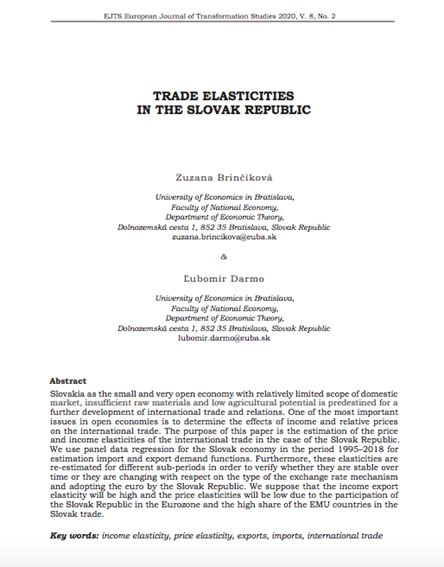
- Hits: 9151
Since its establishment, the Department of Economics has emphasized not only pedagogical activities, but also the development of scientific research activities. The basis for the dynamic development of science and research was the conviction of the members of the department that an integral part of the operation of a top university in the European Educational and Scientific Research Area is quality education and internationally recognized scientific and research activities. The projects of scientific and research activities of the European Commission are primarily focused on basic and applied research and their connection with higher education, cooperation with social and economic practice at home and abroad.
At present, the department focuses its scientific and research activities on the following areas of research.
Current projects:
Smart Transformation and Innovation Consortium Slovakia (STICS)
Funded by the European Union through the NextGenerationEU Recovery and Resilience Plan of the Slovak Republic.
Call code: 09I02-03-V01-00011, „Transformačné a inovačné konzorciá“
Project acronym: STICS
Project duration: 01.04.2025 – 30.09.2027
Project coordinators: prof. Ing. Beáta Gavurová, PhD., MBA, prof. Ing. Anetta Čaplánová, PhD.
Project team members: Ing. Ľubomír Darmo, PhD., Ing. Andrej Přivara, PhD., Ing. Mgr. Mkiyes Hussein, BSc, PhD., Mgr. Martin Rigelský, PhD.
Main project objectives: The project aims to build a new, innovative ecosystem for municipalities based on data sharing among various types of stakeholders. This ecosystem will support the development of advanced domain-specific applications and horizontal services, leveraging heterogeneous and large-scale data sources. The project integrates cutting-edge technologies such as artificial intelligence, big data, edge computing, and distributed ledger technologies. Its outcomes are expected to enhance digital transformation and innovation capacity in public administration and local governance.
Unpacking the Savings Shift: Pension Reform's Influence on Defined Contribution Plan Participants
Funded by the European Union through the NextGenerationEU Recovery and Resilience Plan of the Slovak Republic.
Call code: 09I03-03-V04, “Scholarships for Excellent Researchers R2–R4”
Project acronym: SSDCP
Project duration: 01.09.2024 – 30.06.2026
Project team members: MSc. Estera Szakadatova, PhD., Supervisor: prof. Ing. Anetta Čaplánová, PhD.
Main project objectives: The project aims to broaden insights in the field of behavioural economics and finance by analysing the investment behaviour of Slovak pension savers both in general and within the context of pension savings. The research focuses particularly on how changes in default investment strategies affect saver behaviour, with a focus on studying the impact of behavioural biases on decision-making. The project combines theoretical research with empirical analysis, utilising statistical and econometric methods. Its findings will provide valuable insights into the effectiveness of pension system reforms, enable international comparisons, and deepen the understanding of investor decision-making in various contexts.
Sustainability for Future
Project acronym: Sustain4Future
Call: EIT Higher Education Institutions (HEI) Initiative Call 2024
Action: 01113035-HEI Initiative – HORIZON-EIT-2023-2025-KIC
Project number: 24174
Duration: 1 April 2025 – 30 April 2027
Coordinator: VIA University College, Denmark
Partners:
- Fundació Tecnocampus Mataró-Maresme, Španielsko
- PowerHUB, Česko
- Esslingen University, Nemecko
- Epoka University, Albánsko
- Estonian Entrepreneurship University of Applied Sciences, Estónsko
- Artevelde University Of Applied Sciences, Belgicko
- Univesity West, Švédsko
- Bratislava University of Economics and Business, Slovensko
Project abstract:
The Sustain4Future project responds to the urgent need for higher-education institutions to play a key role in promoting sustainable education. This aligns with the HEI Initiative’s call to build capacity within universities to address global challenges such as climate change, resource depletion, and social inequality. By embedding sustainability into entrepreneurial ecosystems, universities can drive Europe’s transition to a sustainable and inclusive economy.
The project seeks to strengthen the role of universities in integrating sustainability awareness into the educational process through three pillars:
- Promoting entrepreneurial mindsets
- Preparing and supporting entrepreneurs
- Supporting entrepreneurial ecosystems
Sustain4Future builds on HEInnovate activities and brings together nine partners from across Europe, including both experienced institutions and newly involved partners. The consortium combines deep expertise in sustainability management, entrepreneurship, and innovation with a strong regional and international network of partners and existing initiatives.
Enhancing Digital and Soft Skills for Ageing Workforce (EDSAW) Projekt č. 2023-1-SK01-KA220-ADU-000159273
Project duration: 1.4.2024 – 30.9.2026
Project coordinator: prof. Ing. Anetta Čaplánová, PhD.
Project members for the department: Ing. Andrej Přívara, PhD., Ing. Eva Sirakovová, PhD., Ing. Hussein Mkiyes, PhD.
Main objective of the project: The project is specifically aimed at bridging the digital divide in Central Europe with a focus on the development of digital skills among the experienced workforce (workers 50+). The e-learning platform created will provide cutting-edge courses that will contribute to building their digital and soft skills and thus their personal and professional growth. The project consortium is composed of university and non-university partner institutions in Slovakia, the Czech Republic, Spain and Turkey.
Digital Tools in Financial Education: The Role of Gamification in Enhancing Financial Literacy
Project number: Early stage grant - A-25-101/3020-07
Project duration: 2025
Project members for the department: Mgr. Radoslav Zemko
Main objective of the project: The project focuses on the use of online games in student financial education, especially in the area of investing, and examines whether gamification increases student engagement and facilitates the connection between theory and practice.
Education Digital Gateway in the Danube Region - EDIGI-Bridge – Interreg Danube SMF (projekt č. DRP0401226)
Project duration: 1.9.2024 – 31.8.2025
Project coordinator: prof. Ing. Anetta Čaplánová, PhD.
Project members for the department: prof. Ing. Anetta Čaplánová, PhD., Ing. Eva Sirakovová, PhD.
Main objective of the project: The EDIGI-Bridge project is an innovative initiative that aims to prepare a project supporting the development of start-ups with a focus on digitalization in the partner countries of the Danube region. The aim of the project is to prepare a project proposal that will focus on the creation of a comprehensive set of educational programs and advisory services, specifically tailored to support digitally oriented start-ups. The prepared project will provide targeted support for the development of knowledge and skills that are necessary for their success in the digital economy. The prepared project will be based on a thorough needs analysis, which will include the analysis of secondary as well as the collection of primary data, as well as the analysis of relevant policies and strategic documents. A comprehensive study of potential sources of funding and grant schemes will also be processed, which will contribute to the effective selection of the grant scheme in which the project will be submitted. Institutions from Slovakia and Montenegro are participating in the project.
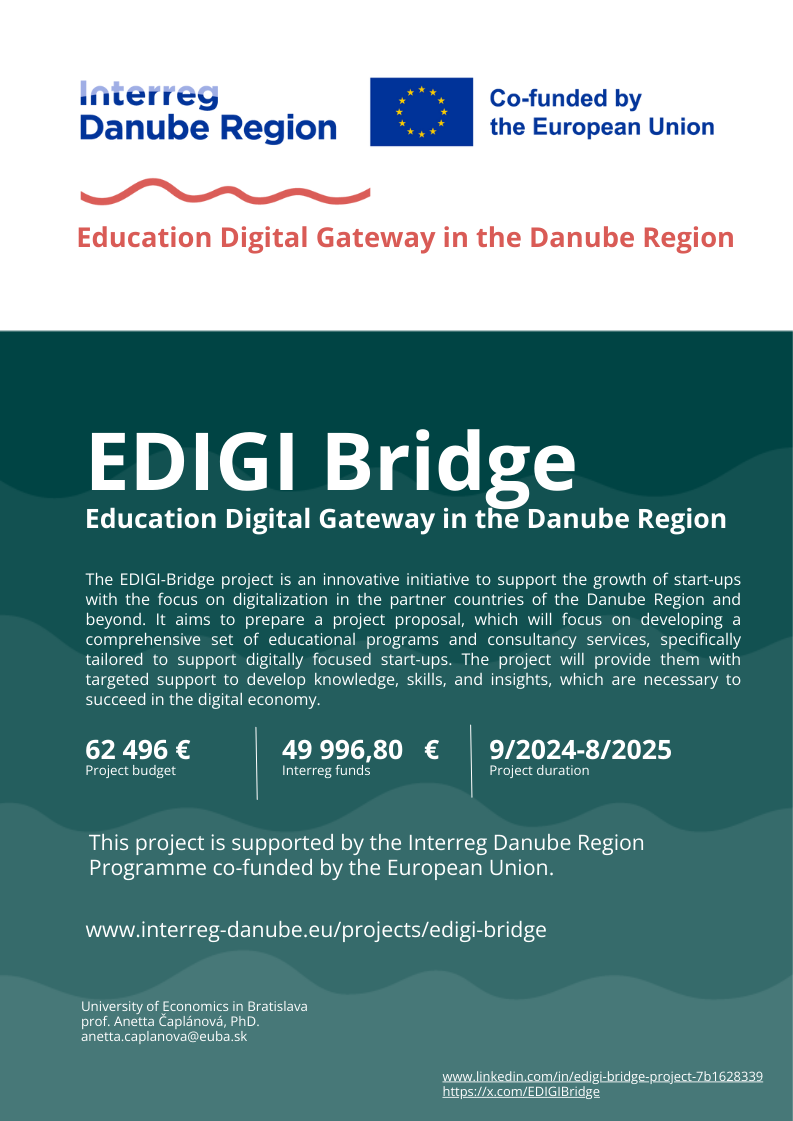
Overcoming Digital Divide in Europe and Southeast Asia ODDEA, Project 101086381, Call: HORIZON-MSCA-2021-SE-01-1
Project duration: 2022 - 2026
Project coordinator: University of Economics in Bratislava
Project members for the department: prof. Ing. Anetta Čaplánová, PhD., Ing. Ľubomír Darmo, PhD., Ing. Eva Sirakovová, PhD., Ing. Andrej Přívara, PhD., Ing. Hussein Mkiyes, PhD.
Main objective of the project: The main objective of the project is to contribute to the formation of a group of researchers in the Southeast Asian region who will focus on digitization processes in a consistent, interdisciplinary and systematic way and identify similarities and differences in the digitization process between the two regions (Europe vs. Asia).
Additional information about the project: The COVID-19 pandemic has highlighted the need for digitalisation, as individuals and governments alike have used digital technologies and skills to address the scientific and socio-economic challenges posed by the pandemic. Digitalization has helped sustain economies and society by enabling remote work, tracking the spread of the virus, and accelerating research into potential treatments and vaccines. This underlined the need for a resilient digital transformation and the strengthening of the digital economy and society. In fact, the European Commission has made the digitalisation of Europe one of its key priorities with the aim of creating a 'Digital Decade'. However, the importance of digitalisation goes beyond Europe, as EU-associated countries such as Montenegro and Southeast Asian developing countries such as Indonesia, Malaysia and Thailand can also benefit from the digital transformation. It can help these countries to accelerate their economic growth, achieve sustainable development and improve the quality of life of their citizens.
Master Studies in Sustainable Development and Management, MASUDEM, ERASMUS-EDU-2022-CBHE-STRAND-2, Projekt č. 101082797
Project duration: 2022 - 2025
Project coordinator: University of Economics in Bratislava
Project members for the department: prof. Ing. Anetta Čaplánová, PhD., Ing. Ľubomír Darmo, PhD., Ing. Eva Sirakovová, PhD., Ing. Andrej Přívara, PhD.
Main objective of the project: The aim of the MASUDEM project is to support sustainable development and job creation in Indonesia and Thailand (Region 5) through the development and improvement of curricula and the capacities of academic and administrative staff at partner universities in these countries.
Additional information about the project: The project aims to address the critical need to promote sustainable growth and the Green Deal and will be instrumental in achieving these goals in partner countries. In the course of the project, the development and accreditation of a new master's program/Concentration in Sustainable Development and Management will take place at the universities of the partner countries. This new programme will be supported by the development of relevant modules of the study programme, the documentation of the course and study texts, as well as the retraining of the academic staff of the partner countries teaching in the programme. In addition, services for Master's students will be in line with best practices, and trained administrative staff will be responsible for providing them.
APVV - Quantification of socio-economic indicators and effects in the management of health and social policy of marginalized communities (Project No. APVV-23-0319)
Project duration: 2024 – 2027
Project leader: prof. Ing. Anetta Čaplánová, PhD.
Project members for the department: prof. Ing. Anetta Čaplánová, PhD., Ing. Ľubomír Darmo, PhD., Ing. Andrej Přívara, PhD., Ing. Eva Sirakovová, PhD.
Main objective of the project: Slovakia is one of the countries significantly burdened by the problem of health inequalities, mainly affecting minority groups of the population living in areas with concentrated poverty. Despite the efforts of institutions to address this problem, there is still no comprehensive analysis in Slovakia that would explicitly quantify the health and its significant determinants of the population in segregated and marginalized communities with impacts on policymaking. Based on the results of the primary research, the main objective of the project is to design a comprehensive multidimensional system enabling the quantification of the development of birth rate, morbidity and mortality metrics in segregated and marginalized communities and to define their importance in the stabilization and regulatory mechanisms of health and social policy in Slovakia. The design of concepts and policies in the field of health and social will be based on the complexity and interconnectedness of the causes of the current situation and the systematic solution of several interconnected problems and the quantification of multidimensional causal relationships of health determinants.
VEGA - Socio-Economic Challenges of the Migration Policy of the Slovak Republic in the Context of the Development of the Labour Market Situation
Project duration: 2024 – 2025
Project leader: Ing. Andrej Přívara, PhD.
Project members for the department: Ing. Andrej Přívara, PhD., prof. Tyran Jean-Robert, PhD., Ing. Mészáros Róbert, Ing., Ing. Mgr. Mkiyes Hussein, PhD., Ing. Rahmat, Najib Rahman, MA
Main objective of the project: The main objective of the project is to identify the socio-economic challenges of the migration policy of the Slovak Republic (SR) related to the acquisition of labour migrants from third countries for the Slovak labour market. The aim is also to propose systemic measures to address shortages in the labour market through the optimisation of migration policy and its effective management of labour migrant flows.
Additional information about the project: The project will address the main demographic and economic trends affecting the Slovak labour market, with a focus on the need for labour. It examines examples of good practice in managing migration flows in other EU countries, while actively participating in expert discussions and publishing scientific articles. The project includes quantifying the potential of labour migrants to address the shortage of skilled labour and organising expert workshops and conferences to present outputs. The collected data will be used to formulate recommendations for the decision-making sphere that will help improve the migration policy of the Slovak Republic.
VEGA - Circular migration of highly skilled labour in EU countries: a challenge for migration policies
Project duration: 2024 – 2026
Project leader: prof. Ing. Magdaléna Přívarová, CSc.
Project members for the department: prof. Ing. Magdaléna Přívarová, CSc., prof. Ing. Čaplánová Anetta, PhD., Ing. Róbert Mészáros, MBA, Ing. Rahmat Najib Rahman, MA, Ing. Trnovský Karol, PhD.
Main objective of the project: The research team has the ambition to review current migration policies in EU countries and outline the main directions that these policies should take, in the context of brain circulation.
Additional information about the project: The research team will focus on the analysis of problems that already exist in practice, but are not yet sufficiently developed in economic theory: determinants of international migration of students, prerequisites for the full use of highly qualified migrants, level shift in the migration policy of the state. On the basis of the examination of these problem areas, hypotheses will be formulated, which will be tested on the basis of empirical data from EU countries.
VEGA - Indebtedness of Economic Entities and Countries in the European Union
Project duration: 2023 - 2026
Project leader: Ing. Marcel Novák, PhD.
Project members for the department: Ing. Ľubomír Darmo, PhD. - deputy project leader, Ing. Ivana Lennerová, PhD., prof. Ing. Ján Lisý, PhD., prof. Ing. Eva Muchová, PhD., Ing. Peter Leško, PhD., Ing. Karol Trnovský, PhD., Ing. Zuzana Brinčíková, PhD., doc. Ing. Marta Martincová, PhD.
Main objective of the project: Based on the assessment of the impact of public debt sustainability and the convergence of tax revenues on the macroeconomic stability of countries and economic entities, we will prepare a proposal for systemic solutions in the area of indebtedness of countries, households and companies.
Additional information about the project: The result of countries' indebtedness in the current period is growing debt and growing indebtedness of economic entities, especially as a result of the pandemic and rising prices. There are problems associated with debt repayment and an increased risk of default - an increase in the risk premium, At the macro level, the government loses room for maneuver for fiscal stimulation of the economy - especially in a situation of low interest rates and high inflation. The indebtedness of Slovak households is growing at the highest rate of EU countries and requires further measures in the area of macroprudential policy. The project will focus on the analysis of public debt sustainability, the search for solutions to eliminate the growth of household indebtedness and measures for the stability of budget revenues with regard to the upcoming reforms based on the approved Recovery and Resilience Plan in the Slovak Republic and EU countries. It will propose systemic solutions in the area of indebtedness of countries, households and companies. It will introduce new schemes in the field of administration and collection of taxes with respect to Ricardian equivalence.
VEGA - Improving the functioning of economic processes using the knowledge of behavioral economics (Theoretical and empirical approach)
Project duration: 2023 - 2026
Project leader: prof. Ing. Anetta Čaplánová, PhD.
Project members for the department: Ing. Eva Sirakovová, PhD., Ing. Ľubomír Darmo, PhD., Ing. Eleonóra Matoušková,PhD., Ing. Mgr. Zsolt Horbulák, PhD. Ing. Andrej Přívara, PhD., Ing. Mgr. Hussein Mkiyes
Main objective of the project: The main objective of the project is to contribute to the development of behavioral economics and the shift of knowledge through the implementation of theoretical and empirical behavioral research and, based on its conclusions, to draw recommendations on better setting of the implementation of measures and public policies.
Additional information about the project: The project will develop scientific knowledge in the field of behavioral economics. Behavioral economics is an interdisciplinary scientific discipline that studies the behavior of individuals and the factors that distance it from rationality. The behavioral approach finds more and more application when economic development has proven the limitations of the rationality paradigm. The project will be based on the systemization of scientific literature and its focus is original research focused on theoretical and empirical testing of selected concepts. The research team examines the decision-making processes of individuals and their implications for the micro and macro spheres. In theoretical research, the researchers model the behavior of economic subjects after taking into account the prospect theory, in the empirical part, using controlled controlled experiments, they verify selected theoretical conclusions of behavioral research and formulate practical recommendations. The project contributes to a shift in knowledge in the field of behavioral economics and to a better understanding of the decision-making of subjects in the studied areas.
KEGA – Educational online platform for teaching economics and financial literacy
Project duration: 2024 – 2026
Project leader: prof. Ing. Eva Muchová, PhD.
Project members for the department: prof. Ing. Eva Muchová, PhD., Ing. Leško Peter,PhD., doc. Ing. Martincová Marta, PhD., Ing. Novák Marcel, PhD., Ing. Darmo Ľubomír, PhD., Ing. Lennerová Ivana, PhD., Ing. Brinčíková Zuzana, PhD.
Main objective of the project: The aim of the project is to create a comprehensive educational online platform for teaching economics with a link to the issue of financial literacy.
Additional information about the project: The project emphasizes the long-term development of students' knowledge in the economic and financial field so that they have the opportunity for self-education and deepening their knowledge. The educational platform is intended for everyone who wants to learn the issues of the modern market economy. Attention is focused mainly on students (version of the platform for students) and applicants for study at the University of Economics, but also students of other faculties of economics in Slovakia. The outputs of the project in electronic form will also be available to university and secondary school teachers (version of the platform for teachers) and the general public. The project also includes the promotion of the platform, or the popularization of economics through the organization of lectures and discussions with experts from economic practice.
KEGA – Economic education through the integration of innovative digitally enhanced teaching strategies
Project duration: 2024 – 2026
Project leader: Ing. Andrej Přívara, PhD.
Project members for the department: Ing. Andrej Přívara, PhD., prof. Ing. Čaplánová Anetta, PhD., Ing. Lennerová Ivana, PhD., Ing. Brinčíková Zuzana, PhD., Ing. Sirakovová Eva, PhD., Ing. Trnovský Karol, PhD., prof. Ing. Přívarová Magdaléna, CSc. Ing. Mészáros Róbert, MBA, Ing. Mgr. Mkiyes Hussein, BSc., PhD., Ing. Rahmat Rahman Najib, MA
Main objective of the project: The main objective of the project is to support the modernization of the Master's degree program in Applied Economics at the University of Economics in Bratislava through the integration of innovative, digitally enhanced teaching strategies. The project aims to improve students' learning outcomes, increase their engagement and critical thinking, and adapt teaching to modern digital tools so that students and educators can better navigate the digital environment.
Additional information about the project: The project will develop a new innovative framework that will be implemented in the Master's degree program Applied Economics. The results of the research will be used to create teaching materials and tools for specific subjects, such as advanced microeconomics and behavioral economics. The project will include a pilot phase, during which the new methodology will be tested and subsequently evaluated. Once the pilot phase has been evaluated, the outputs will be used to improve teaching and prepare students for modern labour markets and the challenges of the 21st century. The outputs of the project will be presented in the form of scientific publications and teaching texts, and active cooperation with international partners is also expected.
Young Researchers Project - Navigating New Horizons: Assessing the Socio-Economic Impacts of Digitalization on Current Migration Patterns
Project duration: 2024 - 2025
Project coordinator: University of Economics in Bratislava
Project members for the department: Ing. Róbert Mészáros, MBA, Ing. Rahmat Rahman Najib, MA
Main objective of the project: The main objective of the project is to monitor the impact of digitalization on migration processes in general, as well as with a special emphasis on socio-economic impacts and labor markets. The purpose of the project is to try to analyze the relationship how these digital platforms, communication technologies and online resources create a framework for migrants' decision-making in reshaping migration trends in a rapidly changing environment.
Additional information about the project: Digitalisation and migration are linked in this regard in a complex way requiring further investigation from an interdisciplinary perspective. A combination of qualitative and quantitative methods will be used for this purpose. Data will be obtained from questionnaires, surveys, interviews and econometric modelling to determine the economic impacts of digitalisation on the labour markets of different economies that are affected by migration. We will also include social media analysis in the research methodology to explore the role of digital platforms in migration and further propose policy guidance based on the research findings. The expected outputs will provide a better understanding of migration dynamics, socio-economic risks, opportunities and strategies that can guide future policies in the digital era.
Projects solved in the previous period:
Collaboration for Effective Digital Education (D-COLLAB) - program Erasmus+
Project duration: 03/2021 - 02/2023
Project coordinator: University of Economics in Bratislava
Project members for the department: prof. Ing. Anetta Čaplánová, PhD., Ing. Ľubomír Darmo, PhD.
Main objective of the project: The D-COLLAB project focuses on the field of digitalization at all levels of higher education with a special focus on Slovakia.
Additional information about the project: The COVID-19 pandemic has shown that in many countries education systems are unprepared for the need to move to digital teaching and learning. While higher education institutions were probably better prepared for the sudden shift to online learning than secondary or primary schools, the degree of complexity of teaching at tertiary level of education also contributes to the complexity of this task. In the midst of the second wave of the COVID-19 pandemic, the D-COLLAB project aims to find and implement effective ways of teaching and learning at tertiary level using digital platforms.
Competitiveness of Slovakia in the conditions of the European Union
Project duration: 2020 - 2022
Project leader: Brinčíková Zuzana, Ing., PhD.
Project members for the department: Ing. Ľubomír Darmo, PhD., Ing. Ivana Lennerová, PhD., Ing. Alexandra Veselková, PhD., doc. Ing. Vieroslava Holková, CSc.
Main objective of the project: Assessment of competitiveness and comparative advantages of the Slovak Republic as a source of economic growth and analysis of the main factors that enable their creation, growth and use in the development of the economy.
Additional information about the project: The partial tasks of the project are: assessment of the role of competitiveness as a factor stimulating economic growth, analysis of comparative advantages of the Slovak Republic and their impact on the competitiveness of the Slovak Republic through various indicators, analysis of the development of comparative advantages of the Slovak Republic before and after accession to the EU and the euro area, assessment of risks arising from the current structure of the Slovak economy, definition of competitiveness determinants and analysis of the degree of their impact, analyze the possibilities of increasing the competitiveness of the Slovak Republic in the current conditions.
Implications of Behavioral Economics for Streamlining the Functioning of Contemporary Economies
Project duration: 2019 - 2022
Project leader: Čaplánová Anetta, prof. Ing., PhD.
Project members for the department: Ing. Eleonóra Matoušková, PhD., Ing. Eva Sirakovová
Main objective of the project: The main objective of the project is to use the knowledge of behavioral economics to deepen the understanding of the decision-making processes of individuals in the micro and macro spheres, to identify deviations from rationality that occur in these processes, to define and test appropriate mechanisms of nudging and reinforcement that will contribute to individuals making better decisions. If we achieve that the deviations of individual actions from rationality are reduced, it will lead to the growth of individual well-being, which will also create the prerequisites for the growth of the well-being of society as a whole.
Additional information about the project: The project focuses on the development of behavioral research at the research institute and in Slovakia. Based on the systemization of literature and original research of researchers, it focuses on identifying deviations from the rationality of individuals that occur in decision-making processes carried out in the micro and macro spheres. Based on the use of the method of randomized controlled experiments, the researchers identify the causes of deviations from rationality in the decision-making of individuals in the private market and in the public sector, especially in the Slovak environment. Using the existing state of knowledge, they will define and test the impacts of an intervention based on nudge and reinforcement mechanisms. They will compare the results of their research with comparable studies in this research area, publish them in scientific journals at home and abroad, and make them available to relevant public policy makers, private sector entities and the general public.
Macroeconomic and Microeconomic Aspects of Indebtedness of Countries and Economic Entities in the European Union
Project duration: 2019 - 2022
Project leader: Novak Marcel, Ing., PhD.
Project members for the department: Ing. Ľubomír Darmo, PhD., prof. Ing. Ján Lisý, PhD., Ing. Karol Trnovský, PhD., doc. Ing. Vieroslava Holková, CSc., Ing. Alexandra Veselková, PhD., prof. Ing. Eva Muchová, PhD., Ing. Katarína Detersová, Ing. Agáta Šuláková, Ing. Peter Leško, PhD., doc. Ing. Marta Martincová, PhD.
Main objective of the project: The aim of the project is to evaluate the impact of public debt on the macroeconomic stability of countries as well as to assess the indebtedness of households.
Additional information about the project: The result of the indebtedness of countries in the current period is growing debt and growing household indebtedness. This leads to problems related to debt repayment and an increased risk of defaulting on one's obligations, which is reflected in an increase in the risk premium. At the macro level, the government is losing room for maneuver for fiscal stimulation of the economy, especially in a situation of low interest rates. The indebtedness of Slovak households is growing at the highest rate among the EU countries, which requires the adoption of macroprudential policy measures. For this reason, it is also necessary to address the issue of financial consumer protection, or the issue of financial literacy of the population. The scientific project focuses on the analysis of the sustainability of public debt and household indebtedness. The main area of interest of the project is a theoretical view of public debt and the possibilities of its financing, an analysis of household indebtedness, a view of the current state of financial consumer protection and the possibilities of preventing the inability to repay household liabilities.
Integration of migrants in the countries of the European Union from the perspective of migration policies
Project duration: 2019 - 2021
Project leaders: Přívarová Magdaléna, prof. Ing., CSc.
Project members for the department: Ing. Ivana Lennerová, PhD., Ing. Eleonóra Matoušková, PhD., Mgr. Ing. Veronika Véghová
The main objective of the project: The research team will focus its research on the reassessment of integration policies in the EU countries and on the outline of the main directions that these policies should take, with particular emphasis on the issue of integration of migrants in the labor market, integration in the field of education and cultural integration.
Learn Economics: application of e-learning as a new form of teaching economics
Project duration: 2020 - 2022
Project leader: Muchová Eva, prof. Ing., PhD.
Project members for the department: Ing. Peter Leško, PhD., Ing. Ľubomír Darmo, PhD., Ing. Karol Trnovský, PhD., Ing. Katarína Detersová
Main objective of the project: The project is aimed at creating multimedia and interactive content for the subjects Economic Theory 1 (basics of microeconomics) and Economic Theory 2 (basics of macroeconomics). The content focus of the project will be based on the latest knowledge in the teaching of these subjects, including the use of modern teaching techniques and technologies.
Additional information about the project: The project also includes the popularization of economics as an interesting and, above all, understandable scientific discipline. The result of the project will be an interactive multimedia platform creating online support for teaching economics. The project also has an international dimension - Prof. Gerald Groshek from the USA is involved in the project as an expert.
Behavioural interventions in local government: increasing the effectiveness of local public policies
Project duration: 2019 - 2022
Project leader: Čaplánová Anetta, prof. Ing., PhD.
Project members for the department: Ing. Eva Sirakovova
Main objective of the project: The global objective of the project is to create a comprehensive catalogue of systematic, financially inexpensive, behavioural interventions (nudges/nudges and others) and to improve the current setting of public administration processes and tools at the local level.
Additional information about the project: The secondary objective of the project is to create a manual for the general application of behavioral knowledge into the practice of public administration, including a manual for the systematic and professional application of behavioral interventions in order to increase the effectiveness of local, public policies. The third goal of the project is to increase the effectiveness of selected local, public policies directly in the partner cities with the help of behavioral knowledge. The application level of the submitted project is the local public administration. The project is solved in cooperation with 4 local governments. The results of the submitted project will be immediately felt by these 4 partner cities, but after their publication they will be immediately usable by any local government in Slovakia. The implementation of this applied research on pilot tests of behavioral interventions will point out the value for money that the application of behavioral interventions can bring to public administration on a practical level. The project will also develop the capacities of Slovak public administration to create policy based on a behavioral approach.
The results of the research are presented by the members of the department at many international and domestic scientific conferences. They publish them in scientific journals and conference proceedings, while many of the results are also reflected in the pedagogical process.
- Hits: 9198
Department of Economics was founded in the academic year 1948/49. At that time, the teaching process was centered on the course "National Economy", which was taught by a well-known Slovak economist - prof. JUDr. Rudolf Briška. JUDr. Štefan Heretik, a famous professor of Methodology of Economics, taught the course of History of Economic Thoughts. He was also an author of the first textbook in this field.
An independent Department of Political Economics was established in February 1950. The founding fathers of the Department included following academics: Pavel Rapoš, Julo Horváth, Felix Hutník, Vladimír Witt, Ľudovít Korček, Vladislav Zbruž, and Ján Přívara. In 1964, The Department of Political Economics was divided into two independent departments, Department of Economic Thoughts and the Department National Economy. In 1970, these departments merged back to the Department of Political Economics and it became the largest department at the Faculty of National Economy in the terms of the number of academics. Library, methodological and education services for staff and students formed an integral part of the Department.
In the 1980s, the number of staff at the Department further increased and their qualification structure improved. Many full-time academics gained doctoral degrees called Candidate of Sciences at that time, or were promoted to professors, or associated professors. The members of the Department were responsible for the university-wide instruction of the course Political Economics and the Department was responsible for the implementation of the study program Political Economics. In December 1989, the Department was renamed the Department of Macroeconomic Theories. The political and economic changes also triggered profound modifications in the curriculum. The Department led by Assoc. Prof. Stanislav Grohmann, PhD. developed a new university-wide course Economic Theory, faculty courses Quantitative Analysis in Economics, Macroeconomics, International Economics and other Economics related courses at all three levels of university instruction. Since September 1991, the Department was renamed the Department of Economic Theory and Economic History and since 2000 it is the Department of Economics. The Department has benefitted from the cooperation with Assoc. prof. Jan Iša, DrSc., who substantially contributed to the development of the Department and teaching curriculum.
Research has belonged to core activities of the Department. The Department has participated in undertaking many theoretical analyses as well as applied research After 1990, the Department has been involved in nationally founded VEGA and KEGA projects, and also international projects such as ESF, TEMPUS, ERASMUS. The Department maintains and develops successful cooperation with international universities, e.g. The University of Antwerp (Belgium), University of Economics in Prague (Czech Republic), School of Business Administration in Karvina of Silesian University in Opava (Czech Republic), University of Marne la Vallée (France), Corvinius University of Budapest (Hungary), Cracow Economic Academy (Poland), University of Granada (Spain), Faculty of Economics and Business Administration, the Complutense University in Madrid (Spain), ICO NIDA, Bangkok (Thailand) and others. The Department regularly hosts visiting staff and students.
Heads of the Department of Economics to date:
| 1950 - 1953 | Julo Horváth |
| 1953 - 1956 | Assoc. Prof. Pavel Rapoš, PhD. |
| 1956 - 1958 | Assoc. Prof. Viktor Pavlenda, PhD. |
| 1958 - 1961 | Prof. Pavel Rapoš, PhD. |
| 1964 - 1970 | Prof. Pavel Rapoš, PhD. |
| 1964 - 1968 | Prof. Viktor Pavlenda, PhD. |
| 1968 - 1970 | Assoc. Prof. Jan Přívara, PhD. |
| 1970 - 1974 | Prof. Pavel Rapoš, DrSc. |
| 1974 - 1979 | Assoc. Prof. Jan Přívara, PhD. |
| 1979 - 1985 | Prof. Pavel Rapoš, DrSc. |
| 1985 - 1986 | Prof. Jozef Košnár, DrSc. |
| 1986 - 1990 | Assoc. Prof. Stanislav Grohmann, PhD. |
| 1990 - 1991 | Prof. Jozef Faltus, PhD. |
| 1991 - 1994 | Assoc. Prof. Ivan Jakúbek, PhD. |
| 1994 - 2000 | Assoc. Prof. Ján Lisý, PhD. |
| 2000 - 2007 | Prof. Ján Lisý, PhD. |
| 2007 - 2011 | Assoc. Prof. Veronika Piovarčiová, PhD. |
| 2011 - 2015 | Assoc. Prof. Veronika Piovarčiová, PhD. |
| 2015 - 2020 | Prof. Eva Muchová, PhD. |
| since 2020 | Prof. Anetta Čaplánová, PhD. |
- Hits: 61522
- Hits: 65153
Department of Economics is responsible for the interdisciplinary study programs Economics and Law (Bachelor's Degree) and Law and Economics (Master's Degree) provided by the Faculty of Economics and Finance of the University of Economics in Bratislava and the Faculty of Law of the Comenius University in Bratislava. The department is also responsible for the study program Applied Economics (Bachelor's and Master's Degree), Management of Public Policies (Bachelor's and Master's Degree).
Department of Economics focuses on teaching basic subjects at the University of Economics in Bratislava – Principles of Economics 1 and Principles of Economics 2, Principles of Economics, Principles of Macroeconomics, Microeconomics, Macroeconomics, Advanced Microeconomics, Advanced Macroeconomics, International Economics and Law, Development of Economic Science, Theory of Public Choice, Behavioral Economics and Methodology of Economics. On III. degree, we provide education in the study field of Economics, where the successful defense of the dissertation ends with the award of the PhD degree.
Economics and Law
Department of Economics guarantees the study program Economics and Law, which offers a combined Bachelor's Degree in the fields of National Economy and Law provided by the Faculty of Economics and Finance of the University of Economics in Bratislava and the Faculty of Law of the Comenius University in Bratislava. Students in our degree program acquire skills in interpreting the law and using legal reasoning, which enables them to navigate the frequent changes in legislation and a wide range of legal opinions. At the same time, students acquire the ability to analyze and correctly understand the processes taking place in the real economic and legal environment at different levels of the national economy. Since 2017, we also co-guarantee the Law and Economics study program at the Master's Degree.
Contact
Department of Economics
Faculty of Economics and Finance, University of Economics in Bratislava
Dolnozemská cesta 1, 852 35 Bratislava
Slovak Republic
Tel.: +421 2 6729 1195, +421 2 6729 1521
- Hits: 98634
Zimný semester 2015/2016
1. TÝŽDEŇ
Informačná spoločnosť
- Teórie informačnej spločnosti Bella, Reicha, Castllsa, Shillera, Habermasa, Giddensa
- SWOT analýza, určenie pozície mediálneho podniku, projektu
2. TÝŽDEŇ
Masové média a súčasná ekonomika
- Postindustriálna spoločnosť a médiá
- Definovanie trhovej pozície mediálneho podniku
3. TÝŽDEŇ
Koncepcia mediaeconomics
- Konkurencia obsahu, voľného času, reklamy, mediaplánovanie
- Založenie a rozvoj podniku
4. TÝŽDEŇ
Mediálny trh a vydavateľská politika
- Vývoj priemyslu tlačených médií, typy trhu, konkurencia, trendy
- Audiovizuálny sektor v mediálnom priemysle, konkurencia, trendy
- Evolúcia stratégie rozhlasu, komerčný, verejný rozhlas – financovanie
- Konvergencia trhov masmédií
- Aký mediálny tovar budeme vyrábať
5. TÝŽDEŇ
Konkurencia na trhu médií
- Princípy riadenia
6. TÝŽDEŇ
Štruktúra masmédií v Slovenskej republike
- Aktuálna štruktúra masmédií v Slovenskej republike a jej komparácia s vybranými krajinami
7. TÝŽDEŇ
Ekonomika
- Fixné a variabilné náklady, výnosy
- Prevádzkový rozpočet
8. TÝŽDEŇ
Ekonomika televízie
- Plánovanie hotovostných tokov v mediálnom podniku
9. TÝŽDEŇ
Ekonomika rozhlasu
- Definovanie jednotlivých pozícií v mediálnom podniku
10. TÝŽDEŇ
Kapitola z hospodárenia online médií
- Modely odmeňovania v médiách – prínosy a riziká
11. TÝŽDEŇ
Najväčšie slovenské podniky v oblasti masmédií
- Spoločnosť 7 Plus, Ringier, Petit Press a iné
12. TÝŽDEŇ
Svetové korporácie – spolupráca či konkurencia
- Bertelsmann, News Co., Viacom, Vivendi Universal, Walt Disney
- CNN, BBC, MTV, FG, WSJ, NYT, El País, Die Zeit, The Economist atď.
13. TÝŽDEŇ
Najväčšie masové médiá a trendy ich vývoja
- Modely a akciové trhy, novinár – reklama a public relations
- Ako udržať autorov v médiu
- Hits: 55205
Zimný semester 2015/2016
1. TÝŽDEŇ
Úvodný seminár. Historický vývoj liberalizmu
- Historické korene liberalizmu
- Hlavné myšlienky liberalizmu v prácach Fréderica Bastiata
- Ich ekonomická interpretácia
2. TÝŽDEŇ
Hlavné myšlienky liberalizmu v prácach vybraných autorov
- Hlavné črty liberalizmu v prácach Doeringa, Friedmana, Hazzlita, Misesa, Rothbarda a iných autorov
- Konfrontácia ich názorov
3. TÝŽDEŇ
Adam Smith ako zakladateľ ekonómie a obhajca slobodného trhu
- Význam Adama Smitha pre formovanie klasického liberalizmu
- Ekonomické názory Adama Smitha
- Neviditeľná ruka trhu a úloha štátu podľa Adama Smitha
- Názory ekonómov dvadsiateho storočia na odkaz Adama Smitha
4. TÝŽDEŇ
Spontánny poriadok F. A. von Hayeka
- Korene myšlienky spontánneho poriadku (škótske osvietenectvo)
- Organizácia a spontánny poriadok
- Jazyk, trh, právo a morálka ako príklady spontánneho poriadku
- Hayekova teória evolúcie spoločnosti
5. TÝŽDEŇ
Spontánny poriadok vs. ekonomická kalkulácia v podmienkach socializmu
- Nemožnosť ekonomickej kalkulácie v podmienkach socializmu podľa Misesa
- Názory Schumpetera a Langeho na možnosti kalkulácie v podmienkach socializmu
- Rozptýlene informácie ako príčina nemožnosti kalkulácie v podmienkach socializmu podľa F. A. von Hayeka
- Schopnosť organizácie a spontánneho poriadku spracovávať informácie
6. TÝŽDEŇ
Spoločenské dopady centrálneho plánovania
- Názory F. A. von Hayeka na centrálne plánovanie
- Právny štát podľa F. A. von Hayeka
- Cesta do nevoľníctva a hlavné odkazy tohto diela pre súčasnosť
7. TÝŽDEŇ
Milton Friedman a konzervativizmus
- Rozdiely medzi liberalizmom a konzervativizmom
- Ukotvenie protrhových názorov Miltona Friedmana v ekonomickej teórii monetarizmu
- Súčasné podoby monetearizmu (nový monetarizmus, trhový monetarizmus). Sloboda voľby
8. TÝŽDEŇ
Podnikateľ, trhový proces a konkurencia
- Úloha podnikateľa v prácach J. A. Schumpetera
- Kreatívna deštrukcia
- Názory Schumpetera na budúcnosť trhovej ekonomiky
- Úloha podnikateľa v prácach F. A. von Hayeka a I. Kirznera
- Konkurencia ako proces objavovania. Komparácia prístupov Schumpetera, Hayeka, Kirznera a neoklasickej ekonómie
9. TÝŽDEŇ
Monopol a protimonopolné zákonodarstvo z pohľadu liberalizmu
- Názory Schumpetera na nedokonalú konkurenciu a monopol
- Nedokonalá konkurencia ako zdroj ekonomického rastu
- Názory M. N. Rothbarda na monopol
- Kritika neoklasického prístupu
- Liberálne názory na protimonopolnú politiku
10. TÝŽDEŇ
Úloha štátu a verejného sektora pri poskytovaní verejných statkov
- Verejné statky ako zlyhanie trhu podľa neoklasickej ekonómie
- Liberálna kritika neoklasického prístupu
- Poskytovanie verejných statkov súkromným sektorom
- Možnosti poskytovania bezpečnosti a spravodlivosti trhom
11. TÝŽDEŇ
Rakúska teória ekonomického cyklu
- Charakteristika monetárnych teórii ekonomického cyklu
- Rakúska teória ako jedna z monetárnych teórii
- Hayekov trojuholník
- Príčina cyklického vývoja podľa rakúskej školy a riešenie kríz
- Komparácia rakúskej teórie ekonomického cyklu s keynesovskou teóriou, monetaristickou teóriou a teóriou reálneho ekonomického cyklu
12. TÝŽDEŇ
Názory rakúskej ekonomickej školy na monetárny systém
- Frakčné bankovníctvo vs. 100% krytie
- Kritika frakčného bankovníctva zo strany M. N. Rothbarda
- Slobodné bankovníctvo F. A. von Hayeka
13. TÝŽDEŇ
Debata o úlohe štátu a trhu na Slovensku
- Hlavní proponenti trhovej ekonomiky na Slovensku
- Diskusia o úlohe monetárnej politiky v slovenskej "blogosfére"
- Hits: 58692
Zimný semester 2015/2016
1. TÝŽDEŇ
Úvod do novej klasickej ekonómie. Lucasova kritika. Nedostatky keynesovských modelov zo 60. a 70. rokov. Základná charakteristika modelov reálneho ekonomického cyklu. Základná nových keynesovských modelov.
2. TÝŽDEŇ
Mikroekonomické základy. Optimalizácia pod obmedzením.
3. TÝŽDEŇ
Charakteristika ekonomického cyklu. Vizualizácia údajov. Hodrick-Prescottov filter. Štylizované údaje o ekonomickom cykle.
4. TÝŽDEŇ
Základný model reálneho ekonomického cyklu bez trhu práce, bez technologického pokroku a populačného rastu.
5. TÝŽDEŇ
Dynamická analýza základného modelu. Reakčné funkcie.
6. TÝŽDEŇ
Linearizácia a log-linearizácia modelu.
7. TÝŽDEŇ
Úvod do programu MATLAB.
8. TÝŽDEŇ
Programovanie základného modelu reálneho ekonomického cyklu v programe MATLAB. Komparácia výsledkov modelu so štylizovanými údajmi. Moment matching.
9. TÝŽDEŇ
Doplnenie technologického pokroku a populačného rastu do modelu. Komparácia výsledkov rozšíreného modelu zo základným modelom.
10. TÝŽDEŇ
Doplnenie trhu práce do modelu. Komparácia výsledkov rozšíreného modelu zo základným modelom.
11. TÝŽDEŇ
Nové keynesovské modely ako rozšírenie modelu reálneho ekonomického cyklu. Základný nový keynesovksý model.
12. TÝŽDEŇ
Programovanie základného nového keynesovského modelu v programe MATLAB. Komparácia výsledkov modelu so štylizovanými údajmi. Moment matching.
13. TÝŽDEŇ
Záverečná práca.
- Hits: 64796
Zimný semester 2015/2016
1. TÝŽDEŇ
Žurnalistika – jav novodobej kultúry
Stručný úvod do raných dôb vzniku novinárstva. Rozvoj obchodu a remesiel v mestách a potreba byť informovaný o udalostiach doma a vo svete – príčina zrodu prvých predchodcov novín. Prvá spojnica európskych miest – dostavníková pošta – ako fenomén komunikovania medzi vyspelými strediskami remesiel a obchodu. Vynájdenie kníhtlače, rýchlolisu, strojovej sadzby, telegrafu a ich využitie mimo žurnalistiky. Rozhlas, televízia a internet – multiplikačné prostriedky novinárskej informácie v súčasnom svete.
2. TÝŽDEŇ
Hospodárske faktory rozvoja modernej žurnalistiky
Potreba byť informovaný vyplýva zo spoločenského charakteru práce. Informácia sociálna a informácia novinárska. Masovokomunikačný proces – od zdroja informácií cez komunikátora, komunikát, médium a recipienta až po spätnú väzbu – a jeho špecifiká v tlači, rozhlase a televízii. Vydavatelia ako limitujúci činiteľ v práci novinárov? (Polygrafický priemysel, papier, náklady novín a inzercia...).
3. TÝŽDEŇ
Žurnalistické prejavy a žurnalistické celky
Prejav – písaný, hovorený a ilustrovaný výstup autora. Celok – komplexné novinárske dielo – noviny, časopisy, rozhlasové a televízne relácie.) Novinár v procese ich tvorby – aktívny element odrážania aktuálnej sociálnej reality. Determinanty kvalifikovanosti novinára a kvality jeho diela. (Vzdelanie, vek, sociálny pôvod, odborná kvalifikácia, pohlavie a zaradenie v redakčnej hierarchii.)
4. TÝŽDEŇ
Tvorba žurnalistických prejavov
Zdroje informácií – ekonomické rubriky a ich novinári preferujú viacero prameňov. Odborné semináre, literatúra, tlačové besedy, analýzy finančných inštitúcií, štatistické údaje odborné noviny a časopisy, dokumentačné oddelenia a archívy, sieť expertov, riadiaci pracovníci rezortov, ekonómovia – vedeckí pracovníci.
5. TÝŽDEŇ
Metódy práce s faktami
Tímový charakter novinárskej práce a individuálny podiel na kvalite žurnalistického prejavu a celku. Proces redigovania ako proces organizovania kvality novín, rozhlasovej tvorby a televíznej produkcie. Päť fáz redigovania : Vymedzenie činnosti, jej sledovanie a zhromažďovanie podkladov, selekcia získaných informácií, tvorba prejavu, apretácia a výroba.
6. TÝŽDEŇ
Autorský vklad v procese redigovania
Poznanie zákonitostí tvorby (od faktov a javov v aktuálnej sociálnej realite k jej odrazu v tlači, rozhlase a televízii) a pochopenie významu operatívneho, ale dôkladného analyzovania situácie. Stabilná účasť na riadení redakcie, využívajúca odbornú špecializáciu redaktora. Organizačná práca a jej konkrétne úlohy. (Iniciačná, organizačná, autorská.)
7. TÝŽDEŇ
Žánrové špecifiká tvorby
Žáner ako osobitná forma odrazu skutočnosti je vyabstrahovaným rámcom predpokladov, do ktorého sú uzavreté reálne fakty a udalosti). Žurnalistické žánre sa vyvíjali v pribehu storočí spolu s vývojom novín a novinárstva. Prameňom sa pre ne stali v raných začiatkoch literárne prejavy a ich druhy.
8. TÝŽDEŇ
Spravodajské žánre
Sú výsledkom činnosti, ktorou je spravodajstvo ako tvorivý proces získavania sociálnych informácií, ich pretvárania na novinárske správy a podávanie (transport) masám recipientov. (Angl. – newsreport, nem. - Nachrichtensendung, maď. – híradás.) Jeho úlohou je informovať recipienta o aktuálnych udalostiach, ktoré prinášajú zmenu k „plusu“, alebo k „mínusu“ v živote spoločnosti.
9. TÝŽDEŇ
Žánrové druhy spravodajstva
Agentúrna správa flešová, krátka správa, rozšírená práva, rámcová správa, komuniké.) Postupy výstavby správ – chronologický, logický, akcentujúci a emfatický. Výber postupu závisí často od plochy v novinách, časového priestoru v rozhlasovej, alebo TV relácii. Niekedy naň vplýva aj tradícia periodika.
10. TÝŽDEŇ
Publicistika
Publicistika buduje na udalostiach a javoch, ktoré významne vplývajú na vývoj spoločnosti a je potrebné ich hodnotiť. Zistiť príčiny a poukázať na dôsledky. Dostať sa k podstate javov v hospodárskom a politickom živote spoločnosti.
11. TÝŽDEŇ
Metódy skúmania
Najčastejšie používame dve metódy skúmania : deduktívnu a induktívnu. Deduktívna odvodzuje konkrétne stanovisko od všeobecných východísk.Induktívna formuje všeobecnú tézu na základe zovšeobecnenia jednotlivých – už preskúmaných – javov. ublicistika sa najviac podieľa na spoluvytváraní verejnej mienky. Odráža totiž udalosti objektívne presne na základe znalosti vecí.
12. - 13. TÝŽDEŇ
Žánre publicistiky
Úvodník – editorial – je určitým programovým vyznaním vydavateľa. Vyjadruje názory a postoje k hlavným problémom spoločnosti. Porovnáva , klasifikuje kvalitu udalostí pútavo a so znalosťou vecí. Je príťažlivý v argumentácii a myšlienkovej hĺbke. Komentár – klasický predstaviteľ analytického žánru. Z lat. commentarius – vysvetľovanie, výklad, záznam. Autor v ňom zaujme stanovisko k situácii na základe poznania príčiny udalostí a ich dosahu na spoločnosť. Poznámka, glosa a recenzia – reprezentanti racionálneho typu stručných postrehov. Fejtón, besednica a Živé slová – žánrové druhy s epištolárnym nábojom (najčastejší reprezentanti ekonomicky zameraných novinárskych prejavov).
- Hits: 66421
Zimný semester 2015/2016
1. TÝŽDEŇ
Hospodárska tematika v tlači, rozhlase a televízii
Úvodom – ekonomická žurnalistika
2. - 3. TÝŽDEŇ
Základné informácie a informačné zdroje I.
- Podnikanie
- Finančné dokumenty;
- Podnik – výročná správa;
- Podnikové stratégie;
- Marketingové stratégie;
- Výkaz ziskov a strát;
- Súvaha;
- Súkromné a verejné spoločnosti;
- Regulácia a orgány dozoru.
4. - 5. TÝŽDEŇ
Základné informácie a informačné zdroje II.
- Financie
- Chýry, klebety, dohady;
- Škandály;
- Obchody a obchodníci;
- Podnikové financie;
- Rizikový kapitál;
- Verejné spoločnosti a ich financovanie;
- Burzy;
- Ako sa hýbu finančné trhy;
- Obchodovanie s derivátmi;
- Trh dlhopisov.
6. - 7. TÝŽDEŇ
Základné informácie a informačné zdroje III.
- Ekonomika
- Ekonómovia a ekonomika;
- Ekonóm;
- Centrálna banka a hospodárska politika;
- Ekonomické indikátory;
- Medzinárodné súvislosti.
8. TÝŽDEŇ
Redigovanie v ekonomickej žurnalistike
- Základy
- Úvod do typov správ a analýz
9. - 10. TÝŽDEŇ
Písanie správ a analýz I.
- Základy
- Informačné zdroje;
- Centrálne a lokálne informačné zdroje;
- Zákon o tlači – verejný záujem a právo na súkromie;
- Medzinárodné podnikanie;
- Podnikanie;
- Podnikanie a médiá;
- Code of Conduct – pravidlá jednotlivých médií a redakcií.
11. - 13. TÝŽDEŇ
Písanie správ a analýz II.
- Typy správ a analýz
- Firma s problémami;
- Úspešná firma;
- Základná správa;
- Analýza fúzie;
- Valné zhromaždenie;
- Správanie sa spotrebiteľov;
- Možnosti investovania;
- Finančné plánovanie;
- Príbeh o daniach;
- Domácnosti;
- Poistenie.
- Hits: 65065
Zimný semester 2015/2016
1. TÝŽDEŇ
Dejiny rétoriky
Predmet a význam rétoriky; dejiny svetovej rétoriky (niektorí známi rečníci svojej doby od antiky až po súčasnosť, významné postavy slovenskej rétoriky - praktici i teoretici); rečníctvo a rétorika ako umenie a ako jeden zo spôsobov verejnej komunikácie, moderná rétorika v dobe rozvoja masovokomunikačných prostriedkov.
2. TÝŽDEŇ
Základné pojmy
Komunikácia, štylistika, rétorika a vzťahy medzi nimi.
3. TÝŽDEŇ
Základné jazykové výrazové prostriedky a špecifické rečnícke prostriedky
Základné jazykové dorozumievacie prostriedky, ich možnosti a miera používania v jednotlivých rečníckych žánroch; špecifické jazykové rečnícke prostriedky - rečnícke figúry.
4. TÝŽDEŇ
Zvuková stránka rečníckych prejavov
Technika reči - otázky dýchania a tvorenia hlasu artikuláciou; správna výslovnosť v slovenčine - chyby vo výslovnosti; intonačné prvky - lingvistické a paralingvistické prvky.
5. TÝŽDEŇ
Kinetická zložka rečníckych prejavov
Sprievodné pohybové prostriedky komunikácie a reči; gestikulácia, klasifikácia gest, interpretácia gest, mimika, pohľad - dôležitosť očného kontaktu počas rečníckeho prejavu, rôzne typy pohľadov v komunikácii; proxemika - vo vzťahu k rečníckym žánrom, zónové vzdialenosti a ich využitie v praxi.
6. TÝŽDEŇ
Rečnícke žánre
Písomný a ústny prejav – charakteristika; prejav čítaný, prejav spamäti, foneticko-akustická rétorika; politický prejav a politický referát; diskusia, debata a polemika, interview, tlačová konferencia, rétorika a reklama; diplomatická rétorika, ceremoniálne a slávnostné prejavy.
7. TÝŽDEŇ
Rečník a poslucháč - ich vzájomný vzťah
Príprava rečníka na vystúpenie, každý poslucháč je iný, tajomstvá udržania pozornosti a záujmu poslucháčov; dialóg versus monológ - zaujať, presvedčiť, nie manipulovať, umenie počúvať a technika kladenia otázok; argumentácia - základné zásady umenia presviedčať, druhy argumentov, chyby v argumentácii.
8. TÝŽDEŇ
Tréma - čo s ňou
Tréma nie je len negatívna, ale aj pozitívna; analýza a bilancia prejavu po vystúpení - vlastné hodnotenie alebo hodnotenie pomocou druhej osoby.
9. TÝŽDEŇ
Zásady hovoreného prejavu
Vlastný pohľad na problém, inšpirácia, pracovná osnova, precvičenie reči.
10. TÝŽDEŇ
Prípadové štúdie
Analýza najčastejších chýb neskúsených rečníkov, bezduché reakcie - identifikácia nechcených reakcií a slov, ktorých by sa mal každý rečník vyvarovať, príklady niektorých nevhodných formulácií.
11. TÝŽDEŇ
Praktické precvičenie prejavu na vybranú tému s audionahrávkou
Prezentácia, rozbor a hodnotenie ústnych rečníckych prejavov.
12. TÝŽDEŇ
Praktické precvičenie prejavu na vybranú tému s audionahrávkou
Prezentácia, rozbor a hodnotenie ústnych rečníckych prejavov.
13. TÝŽDEŇ
Praktické precvičenie prejavu na vybranú tému s audionahrávkou
Prezentácia, rozbor a hodnotenie ústnych rečníckych prejavov.
- Hits: 68589
Strategic partner
Main Partners
Partners

